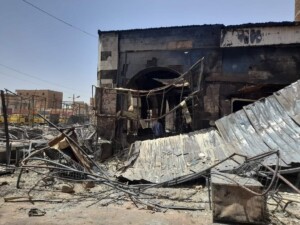Old Darfur cinemas source of knowledge and enlightenment
Darfur Special: Years after El Fasher Cinema screened its last film, people are awaiting the decision of the new owner. Darfur’s two cinemas were forced to close the doors in 2003.
Years after El Fasher Cinema screened its last film, people are awaiting the decision of the new owner. As one of just two cinemas in Darfur, it was forced to close its doors when the armed conflict in the region erupted in 2003.
“El Fasher Cinema used to be one of the region’s cultural outlets that linked the people of Darfur with the outside world through films,” said Saleh Timsah, original director of the cinema in the state capital of North Darfur. Speaking to Radio Dabanga, the director explained how the cinema gained in popularity among the local population in the last century, and what caused its demise.
The 1,000-square-metre El Fasher Cinema, opened on Friday 13 January 1963 with El Hijeira Nabawiya, a film portraying the travels of the Prophet Mohamed. “It was well received. Some children, however, endured nightmares because of the frightening scenes,” Timsah remembered. “Subsequently, parents prevented their children from watching it. Teachers felt obligated to alert and comfort children standing in the queue for a ticket that those nightmares will end after a while.”
Timsah was appointed as the first director of National Cinema El Fasher in 1963. He noticed that the films brought enlightenment and awareness among the people. “The audience learned about the celebrity world of writers, artists, poets, and novelists, and learned about the international community and international forms of politics.”
“The cinema blossomed because of a lack of entertainment in Darfur. It grew into a cultural landmark.”
The golden age for El Fasher Cinema lasted from the late ‘60s to the early ‘80s, when it became a haven for many people in El Fasher, featured international films and competed with Cinema Nyala, the only other cinema in Darfur. “Because of the lack of entertainment in Darfur, cinemas were able to dominate in this scene,” Timsah said.
Some families booked their tickets a week in advance so they would not have to queue in front of the box office that opened three hours before the start of the Arab or Indian film, or a Hollywood production. “You can imagine that the row sometimes started at the end of the market, and was about 500 metres long.”
The 1,500 seats were divided into three price ranges, from five to fifteen Sudanese pounds. The upper class gathered in balcony seats where they enjoyed the service of drinks, that were permissible then, and a high-end buffet or sweets. “The cinema grew into an important cultural landmark in El Fasher city and for its residents.”
Pioneers in Nyala
Ali El Sanusi, a historian in Nyala, told Radio Dabanga that the opening of Cinema Nyala coincided with the arrival of the railway line to the capital of South Darfur in 1961.

Cinema Nyala in 2016 (RD)
The film offer in Nyala varied from westerns, Arab films, films about espionage, and films from India. According to Sanusi, Cinema Nyala was known as a pioneer in importing the latest films produced by international film companies. “Nyala sometimes screened new films that had not yet been screened in theatres in Khartoum. It attracted famous Sudanese singers and theatre actors to the city.”
The word about the latest films spread easily in the city thanks to big advertisements of the local film department and posters on display throughout Nyala. “The audience must remember a man nicknamed The Joker, who moved through the streets calling upon people to not miss the latest film.”
Controls and taxes
A federal committee reviewed the films before they were allowed in public. “The controls were strict and reviewed the possible impact of the film on the society in Darfur, people’s beliefs, and social traditions,” said Timsah from El Fasher.
Starting the ‘80s, the decline of El Fasher Cinema and Cinema Nyala set in. Unfavourable policies of the Central Bank of Sudan on foreign currencies became a burden for the import of films, along with the state’s imposition of fees and taxes.
The Sudanese government took a stance against the international films after President Omar Al Bashir seized power in 1989, enforcing Islamic codes and banning trade unions. This affected all cinemas in the country.

El Fasher Cinema in 2016 (RD)
According to historian Sanusi, the last film the public of Nyala Cinema watched was an Indian film in April 2003, the same year that the fighting between the Sudanese army and the armed rebels erupted in the region.
War closes doors
Film shows in both El Fasher and Nyala have stopped since 2003, with the start of the war in Darfur and the government’s declaration of a State of Emergency. This gives exceptional powers to authorities, including the right to forbid mass gatherings and close public spaces such as theatres, bars, and museums.
Nowadays, the El Fasher Cinema space has been vacant. or used as a grocery store. According to director Timsah, there might be a happy ending for the cinema industry in Darfur after all. “After several administrative problems, the shares of the cinema were sold to a Sudanese businessman, named Siddig Wadaa, in 2007.” He said that the public in El Fasher is still waiting for the new owner’s decision about the future of the once bustling cinema.
Also in Features:
Challenges for theatre in Darfur












 and then
and then